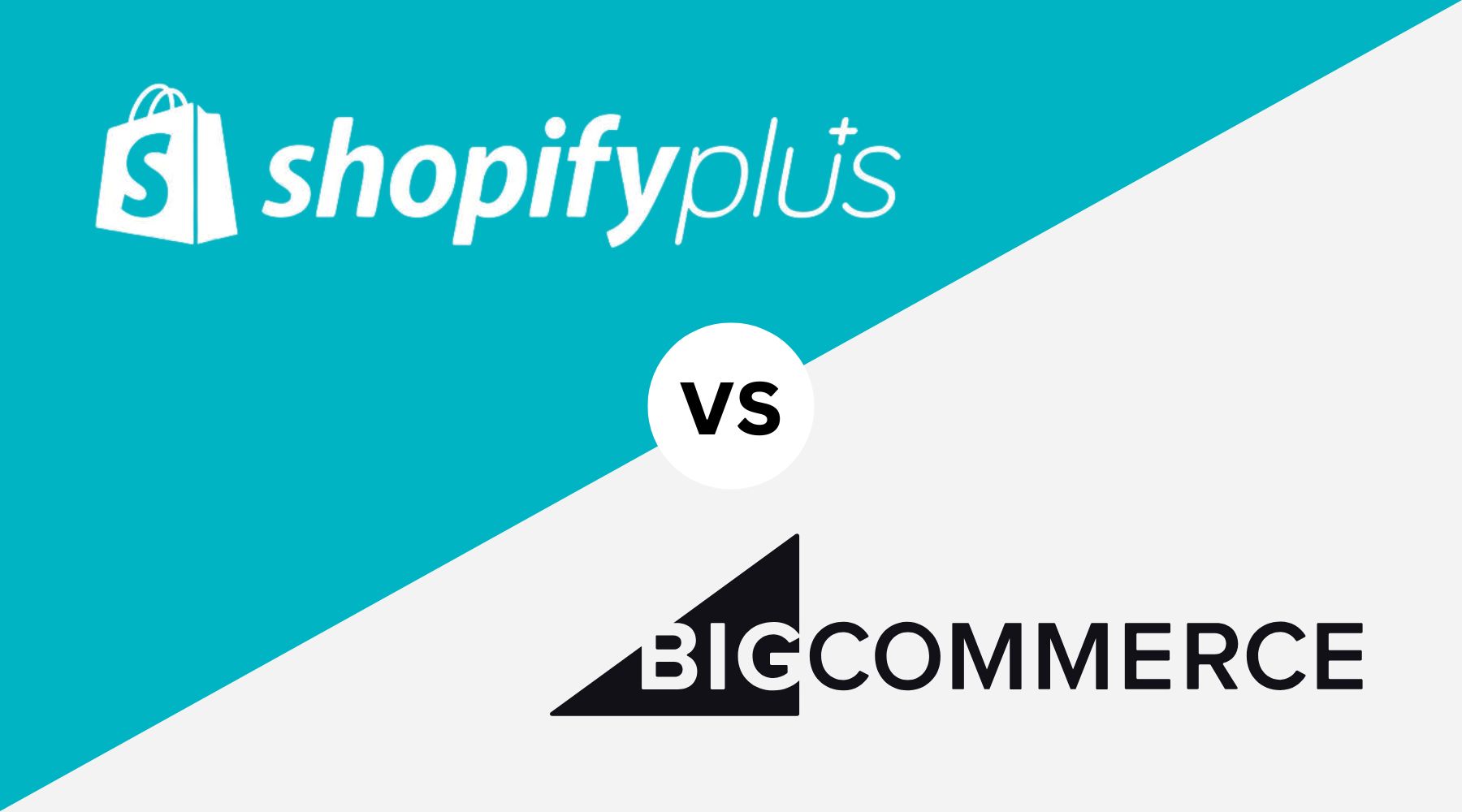When online stores reach a certain size, the choice of platform becomes more than a technical detail. It’s a strategic decision that shapes performance, flexibility, and growth. Enterprise-level ecommerce tools are built to handle complexity: from multi-channel selling and automation to custom workflows and international scale.
This comparison explores two of the most prominent solutions in that space: BigCommerce Enterprise vs Shopify Plus. Both aim to support ambitious brands with robust infrastructures and tailored feature sets. But depending on your business goals, the better fit might not be the one with the longest feature list, but the one that removes friction where it counts.
In this article, we break down the most relevant factors:
- who each platform is really made for,
- how they handle customization and integrations,
- which tools support scaling across channels and borders,
- what kind of checkout experience and B2B support you can expect,
- and how the pricing structures compare behind the marketing claims.
If you're looking for expert support during the decision-making or implementation phase, our Shopify Plus agency can guide you through every step, from technical setup to long-term scaling.
Shopify Plus vs BigCommerce Enterprise at a Glance
|
Key Features |
BigCommerce |
Shopify Plus |
|
Free Trial |
Yes |
Yes |
|
24/7 Support |
Yes (tiered) |
Yes (priority access) |
|
Sell Online & In-Store |
Requires POS add-on |
Built-in POS ecosystem |
|
Business Capital |
Limited availability |
Shopify Capital available |
|
Custom Domain |
Included |
Included |
|
SEO Features |
Solid |
Advanced + SEO apps |
|
Hosting |
Cloud-based |
Fully managed cloud |
|
Sell Worldwide |
Supported |
Strong global reach |
|
Multi-Currency Support |
Yes |
Yes (native & flexible) |
|
Mobile-Friendly |
Yes |
Optimized by default |
|
Fraud Protection |
Basic |
Shopify Protect (US only) |
|
Integrated Checkout |
Customizable |
Lightning-fast & secure |
|
Fulfillment Network |
Third-party reliant |
Shopify Fulfillment (US) |
|
Email Marketing Tools |
Via integrations |
Shopify Email built-in |
|
App Store |
1,000+ apps |
6,000+ apps |
|
Mobile App for Merchants |
Yes |
Yes (robust functionality) |

BigCommerce Enterprise vs Shopify Plus: 10 points of comparison
1. Pricing Transparency & Total Cost of Ownership
Enterprise platforms aren’t just about features, they’re long-term financial commitments. That’s why pricing clarity is critical when evaluating the true cost of running and scaling your ecommerce business.
One solution operates on a flat-rate subscription model, which includes most essentials out of the box. From dedicated support to checkout customization, the monthly rate remains predictable, allowing for better financial planning. Transaction fees can be avoided with native payment options, keeping costs streamlined.
The alternative often bases pricing on Gross Merchandise Volume (GMV), which means that fees scale with revenue, a setup that may appear flexible but can become expensive as sales increase. Additional charges for advanced support tiers, integrations, or extra API calls are common, especially as your operations grow.
What’s often overlooked are the hidden costs: onboarding, third-party tools, developer time, and licensing fees for modules. These extras can push the total cost of ownership far beyond initial estimates, particularly for fast-scaling brands.
To avoid surprises and align your tech budget with business goals, working with experienced advisors can make all the difference. Our Shopify Plus Consulting service helps you map out exact costs and optimize your setup from day one.
2. Setup Time, Ease of Use & Admin UX
One of the biggest differentiators between Shopify Plus and BigCommerce Enterprise is how quickly teams can get started and how intuitive the daily admin experience feels.
Shopify Plus is known for its fast onboarding and user-friendly backend. Thanks to visual editors, no-code tools, and a consistent UI, even non-technical teams can manage products, launch campaigns, and update storefronts without relying on developers. This empowers marketing and operations to move quickly and independently.
In contrast, BigCommerce Enterprise offers more native customization options but comes with a steeper learning curve. While it provides flexibility for technical teams, day-to-day tasks often require developer involvement, especially during setup or when adjusting templates and workflows.
If your team needs to hit the ground running or minimize internal training, Shopify Plus has the edge. Agencies like ours offer Shopify Plus Development Services to help you launch faster and streamline the backend to fit your exact business needs, without the usual delays.

3. Scalability & Global Expansion Readiness
When it comes to growth, enterprise platforms need more than just uptime. They need infrastructure that supports international operations, multiple storefronts, and localized experiences.
BigCommerce Enterprise is built with native multi-storefront functionality, which allows businesses to manage multiple brands or regional sites under one account. However, implementation often depends on developer support and custom logic.
Shopify Plus also supports expansion through expansion stores and the Markets feature, designed to simplify cross-border selling with a lower technical barrier. It enables fast scaling for DTC brands and hybrid models alike.
Here’s how both platforms compare across key scalability features:
- Multi-store management
- Shopify Plus: Expansion stores with shared backend logic
- BigCommerce Enterprise: Native multi-storefronts within one environment
- Localization tools
- Shopify Plus: Built-in support for multiple languages, currencies, and regions via Shopify Markets
- BigCommerce Enterprise: Strong control through APIs, but more developer-heavy
- Tax & compliance handling
- Shopify Plus: Automatic tax rules for major markets
- BigCommerce Enterprise: Highly customizable, but often requires integration
- Performance & reliability
- Both platforms boast 99.9% uptime and global CDN infrastructure, but Shopify Plus benefits from a massive merchant base and proven enterprise load stability.
4. Customization, APIs & Headless Commerce
Modern commerce platforms must offer more than out-of-the-box templates. They need flexible architectures that can be molded to fit unique business logic, third-party systems, and evolving customer expectations.
Shopify Plus provides robust customization through its Hydrogen framework, Liquid templating, and access to advanced APIs. With native GraphQL support, metafields, and flexible content management, teams can craft custom experiences, whether via traditional front-ends or headless builds.
Hydrogen and Oxygen (Shopify’s headless stack) offer a streamlined developer path without reinventing the infrastructure.
BigCommerce Enterprise is API-first by design, offering more backend control from the start. Developers can work in any language or framework, thanks to open REST and GraphQL APIs. However, certain advanced features still rely on third-party apps or custom coding.
Key comparison points:
- GraphQL & REST APIs
- Shopify Plus: Strong GraphQL coverage with evolving support
- BigCommerce Enterprise: Mature REST APIs, limited GraphQL depth
- Headless commerce support
- Shopify Plus: Hydrogen + Oxygen = end-to-end stack
- BigCommerce Enterprise: Fully decoupled, flexible, but more setup overhead
- Customization ease
- Shopify Plus: Ideal for brands wanting structured flexibility
- BigCommerce Enterprise: Better for teams with in-house developers
5. Ecosystem & App Marketplace
An enterprise platform is only as powerful as its surrounding ecosystem. From third-party integrations to community innovation, the broader support structure can make or break scalability.
Shopify Plus stands out with its massive app store and rapidly growing partner ecosystem. With over 8,000 apps—many free or purpose-built—merchants can extend their store in any direction. The community is vibrant, and innovation cycles are fast.
BigCommerce Enterprise emphasizes native features to reduce dependency on external apps. While this lowers complexity, it can also limit agility when custom features or niche solutions are required.
Ecosystem insights:
- App store size & variety
- Shopify Plus: 8,000+ apps, many enterprise-ready
- BigCommerce Enterprise: Smaller app store, focused on core capabilities
- Native tools vs. integrations
- Shopify Plus: Leverages best-in-class external tools
- BigCommerce Enterprise: Builds more features in-house
- Community & innovation pace
- Shopify Plus: Thriving development community, frequent updates
- BigCommerce Enterprise: Smaller ecosystem, slower iteration
Curious how Shopify’s extended feature set compares with other platform tiers? Our breakdown of Shopify Advanced vs Shopify Plus helps clarify which version fits your business needs best.

6. Checkout Experience & Conversion Optimization
The checkout is where purchase intent turns into revenue. Especially on mobile, the process needs to be fast, intuitive, and trustworthy.
One platform enables merchants to extend checkout logic server-side: handling discounts, shipping conditions, or payment methods without heavy coding. Another gives full code-level access, offering total control but also more development overhead.
Key evaluation points include:
- Customizability without compromising performance
- Mobile-first performance to reduce bounce rates
- Built-in support for A/B testing and conversion tracking
7. B2B & DTC Capabilities Compared
B2B commerce brings entirely different demands than DTC. From dynamic pricing and customer roles to approval workflows - flexibility is key.
Some platforms shine with advanced catalog controls, tiered discounts, and dedicated buyer portals. Others take a unified backend approach, allowing you to manage wholesale and retail under one interface.
Including:
- payment terms,
- business accounts, and
- order limits.
Key considerations include:
- How flexible is pricing, catalog, and role management?
- Can B2B and DTC be handled within the same system or are they siloed?
- What level of customization is required to meet enterprise wholesale needs?
For a closer look at alternative B2B-focused platforms, explore our comparison: Zoey vs Shopify Plus.

8. Integration Depth: ERP, CRM, Analytics
Enterprise commerce requires seamlessdata flow, from inventory and fulfillment to customer insights. That’s why integration capabilities often make or break a platform choice.
Some systems offer plug-and-play setups with major ERPs and CRMs, while others rely on middleware or custom APIs. It’s essential to evaluate how each solution fits into your existing tech stack.
Key questions to ask:
- Can your finance team work easily with SAP or NetSuite?
- Do HubSpot or Salesforce sync bi-directionally without breaking?
- Are analytics tools already included or do they require third-party apps?
For a deep dive into ERP compatibility, especially with Oracle NetSuite, our full Shopify Plus vs NetSuite guide breaks down where the systems align and where they don't.
9. SEO & Marketing Features
Strong technical SEO and smart marketing tools are essential for enterprise growth. Both platforms in question support these areas, but not equally.
While both systems allow URL customization, meta tag editing, and automated sitemaps, the level of control and usability differs. Shopify Plus comes with a native blogging engine and strong support for structured data, while BigCommerce Enterprise leans more on developer-dependent solutions for advanced SEO setups.
Marketing capabilities show a similar divide. Built-in features like email marketing or abandoned cart recovery tend to be more intuitive and better integrated in Shopify’s ecosystem. BigCommerce, while flexible, often requires third-party tools for tasks Shopify handles natively.
Comparison at a glance:
- Content & Blogging: Shopify’s blog functionality is more robust out of the box; BigCommerce may require workarounds for editorial SEO.
- Technical SEO: Both platforms support schema, redirects, and sitemaps, but Shopify offers more low-code options.
- Marketing Tools: Shopify Email, automated campaigns, and native integrations give it an edge in usability. BigCommerce needs additional tools to match.
If content plays a central role in your growth strategy, it's worth reviewing how platforms like Scayle compare to Shopify Plus. You’ll find a breakdown in our Scayle vs Shopify Plus guide.

10. Security, Compliance & Support
Enterprise commerce demands more than just performance, it demands trust. That’s why security, compliance, and reliable support are non-negotiable.
Both platforms meet core standards like PCI-DSS compliance, enabling secure online transactions by default. When it comes to GDPR readiness, both offer tools for data access and deletion, although implementation details often fall on the merchant side.
Where the difference becomes clearer is in enterprise-specific support:
- Shopify Plus provides access to dedicated Launch Engineers during onboarding, helping brands get up and running smoothly. Ongoing support is available 24/7, with prioritized response times and merchant success teams that specialize in high-growth environments.
- BigCommerce Enterprise offers support tiers based on plan size. While all plans include 24/7 access, hands-on assistance for technical implementations or migrations may require additional service agreements or third-party consultants.
In highly regulated industries or markets where uptime and compliance are critical, clarity and speed of support can tip the balance. Businesses evaluating these platforms should also consider the level of support required as they scale, because a fast response can mean the difference between a hiccup and a halt.
Final Verdict: Which Platform Wins for Whom?
Choosing between Shopify Plus and BigCommerce Enterprise isn’t about counting features. It’s about understanding your priorities and picking the platform that removes friction, not adds it.
If you're a fast-growing DTC brand looking for speed, simplicity, and scalability, Shopify Plus offers a future-proof ecosystem. From streamlined onboarding to native global selling and a thriving app marketplace, it’s designed to support growth without requiring a developer for every tweak.
For teams with lean tech resources and a strong focus on marketing agility, this platform is often the shortest path to scale.
On the other hand, if your business runs complex B2B operations, with deep pricing rules, custom catalogs, and tailored buyer experiences, BigCommerce Enterprise may offer the architectural flexibility you need. But be ready for a steeper learning curve and heavier developer involvement.
Still unsure if it’s time to upgrade or whether you’ve outgrown your current stack? Then our Shopify Plus vs Magento breakdown might help you take that next strategic step.
In the end, the best enterprise platform isn’t the one with the most bells and whistles. It’s the one your team can actually use - at scale, without friction.








